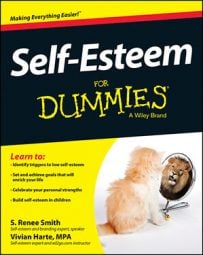-
Choose one negative thought you have about yourself and write down the positive opposite that counteracts that belief. For example, you may often think, “I make so many mistakes.” In this case, you would write an affirmation like, “I am capable and experienced.”
-
Make your affirmations short so they’re easier for you to remember. Even statements as short as four or five words can be powerful.
-
Start your affirmations with “I” or “My.” Because you’re making a statement about yourself, it’s most effective if it starts with you. “I choose to be positive” is much better than “Positive thoughts are coming into my mind.”
-
Write your affirmations in the present tense. Write as though you’re experiencing what you desire right now, not in the future. For example, “I easily see my own worth and value” is better than “I will easily see my own worth and value.” It’s also better not to put a time frame on your affirmation, such as a certain date or “within three months,” because doing so limits your time to make it happen.
-
Don’t begin your affirmations with “I want” or “I need.” You don’t want to affirm that you’re wanting and needing. Rather, write your affirmations as an expression of being grateful for already having and being what you want.
-
Make sure all of your affirmations are positive statements. If you tell yourself you are discarding negative behavior and thoughts, your focus will be on those rather than on what you want to do and be. Don’t include words like “don’t,” “won’t,” “am not,” “can’t,” “not,” “doesn’t,” or “am stopping.” Instead of “I’m eliminating my miserable thoughts,” create an affirmation such as, “I’m happy being who I am.”
-
Add emotion to your affirmations by inserting, “I am [emotion] about . . .” or “I feel [emotion].” For example, you could say, “I am excited about being able to express what I think.”
-
Create affirmations that will work. If you don’t believe your statement, you’ll take timid actions and be hesitant, certain that you won’t be able to succeed. If you write an affirmation that is truly difficult for you to believe, write another one that starts with, “I am open to . . .” or “I am willing to believe I could . . . .”
You can also create an affirmation that is close enough to your current situation to be realistic and achievable, such as, “I am speaking up one or two times at future meetings I attend.”
Positive words to use in your affirmations
Let's get positive, people! Saying and thinking affirmations often is one of the most valuable ways to change your self-talk. If you say uplifting things to yourself that help you reach your goals and reflect the sense of self-worth that you’re developing, you’ll head in a new and healthier direction.Following are some tips for writing your own affirmations:
-
Choose a negative thought and write its positive opposite.
-
Make your affirmations only a few words long.
-
Start your affirmations with “I” or “My.”
-
Write your affirmations in the present tense.
-
Write as though you’re grateful for already having and being what you want.
-
Make all your affirmations positive statements.
-
Add emotion to your affirmations.
-
Create affirmations that are realistic and achievable.
| Amazed | Empowered | Happy | Optimistic | Thankful |
| Appreciated | Energetic | Harmonious | Passionate | Understanding |
| Appreciative | Enthusiastic | Inspired | Positive | Unlimited |
| Confident | Excited | Invigorated | Powerful | Uplifted |
| Courageous | Expanded | Joyous | Proud | Vibrant |
| Creative | Exuberant | Lovable | Radiant | Vivacious |
| Delighted | Focused | Loving | Renewed | Warm |
| Dynamic | Fortunate | Luxurious | Serene | Wise |
| Eager | Free | Open | Strong | Worthy |

